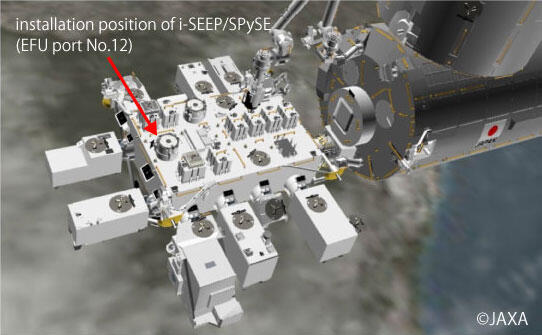Decision to conduct a demonstration experiment
for the practical use of all-solid-state lithium-ion batteries in space.
~Scheduled to launch to the Japanese Experiment Module "Kibo" in the fall of 2021 or later~
February 2, 2021 (JST)
National Research and Development Agency
Japan Aerospace Exploration Agency (JAXA)
Hitachi Zosen Corporation
National Research and Development Agency Japan Aerospace Exploration Agency (President: Hiroshi Yamakawa, hereafter JAXA) and Hitachi Zosen Corporation (President & COO: Sadao Mino, hereafter Hitachi Zosen) concluded a joint research agreement on the world's first demonstration experiment for the practical use of all-solid-state lithium-ion batteries in space.
JAXA and Hitachi Zosen have been collaborating on the development of all-solid-state lithium-ion batteries since 2016 under the framework of the Space Exploration Innovation Hub's call for research proposals (*1). All-solid-state lithium-ion batteries are attracting attention as the mainstay of next-generation batteries, and are expected to be used in a variety of devices.
Conventional lithium-ion batteries used in space use liquid and have a narrow operating temperature
range. This makes them difficult to use in a vacuum and in a harsh space environment with extreme temperature differences. For this reason, they are installed inside equipment such as under the controlled temperature.
We have been, therefore, jointly studying and developing a prototype of all-solid-state lithium-ion
batteries that can be used in a vacuum condition and severe high and low temperature environment.
JAXA and Hitachi Zosen will conduct an on-orbit experiment to evaluate and verify the prototype battery in the actual space environment.
In the demonstration experiment, an all-solid-state lithium-ion battery will be installed in the
Small Payload Support Equipment (SPySE) (*2) on the IVA-replaceable Small Exposed Experiment
Platform (i-SEEP) installed on the Exposed Facility of the Japanese Experiment Module "Kibo" on the International Space Station (ISS). We will check whether the all-solid-state lithium-ion battery can operate in a harsh environment.
From now on, we plan to develop equipment necessary for the space demonstration of all-solid-state
battery and conduct verification test, etc. We will launch the equipment to the ISS in the fall of 2021 or later, and conduct demonstration tests for about six months from the end of 2021.
The use of all-solid-state lithium-ion do not need strict temperature control, which can contribute
to miniaturizing, lightening and reducing power consumption of equipment used in the space environment. It is also expected to be used for lunar and Mars explorers, which are subjected to harsher temperature environments, as well as for rovers that serve as mobility and observation equipment on the Moon.
【Overview of the all-solid-state lithium-ion battery to be used in the demonstration
experiment】
We will use the all-solid-state lithium-ion batteries that have been jointly researched and
developed by JAXA and Hitachi Zosen, based on the battery developed by Hitachi Zosen in 2016.
Size: 65mm×52mm×2.7mm
Mass: 25g
Capacity:140mAh (to be connected in parallel with 15 cells to make a power supply of about 2.1Ah)
Features:
① The use of solid electrolyte prevents solidification at low temperature and decomposition of the solid electrolyte at high temperatures, enabling stable operation even in an environment ranging from -40°C to 120°C.
② Since no liquid material is used, there is no leakage, and since the solid electrolyte is flame-retardant, there is no risk of ignition, smoking, or rupture.
③ Battery configuration with microminiaturized volatile components and almost no expansion even under vacuum.
*1 In 2016, JAXA signed an agreement with National Research and Development Agency Japan Science and Technology Agency to collaborate on the development of “all-solid-state lithium-ion secondary batteries” in the "innovation hub construction support" (Open Innovation Hub for Expanding Humanosphere and Domain of Human Activity through Solar System Frontier Development), which was entrusted with JAXA. *2 An experiment infrastructure that has been developed by JAXA to diversify and expand the use of the IVA-replaceable Small Exposed Experiment Platform (i-SEEP), which is installed on the Exposed Facility of the Japanese Experiment Module "Kibo" on the ISS. It will be attached to one side of the i-SEEP's equipment loading area to provide and interface that allows up to 8 small equipment (10 cm square in area, 30 cm maximum in height) to ride together. JAXA also plans to conduct a functional verification of SPySE through the installment of the all-solid-state lithium-ion battery.

